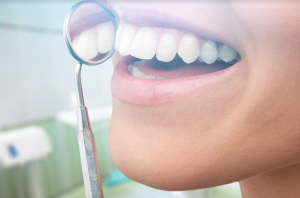
Here are a few of the things that you should look for to identify an infected, or abscessed tooth.
Tooth Sensitivity to Temperatures – One of the first things that you may notice is that eating or drinking cold or hot foods and drinks may trigger sensitivity. Some patients find that one end of the temperature spectrum will trigger their tooth sensitivity, while hot or cold temperatures equally impact other people. One thing to consider with tooth sensitivity is the area where the tooth is sensitive. While an infected tooth may be sensitive, you can often identify the individual tooth or at least the general area where it occurs. If temperatures make all of your teeth sensitive, or an entire arch of your teeth, the issue may not be an infected tooth.
Sensitivity or Pain During Eating – Tooth infections generally become noticeable because the internal structure of the tooth, the pulp, has become irritated and inflamed. Because the pulp is held inside of the bone, once it swells to a certain point, it only increases the pressure within the tooth. The pain is caused by the pressure exerted on the nerves within the tooth. This means that sometimes in the earlier stages of tooth infection, the process of eating places just a little more pressure on the tooth and can trigger the pain as we chew.
Tender or Swollen Lymph Nodes – Once your body recognizes that there is an infection, it will begin to fight it, activating the lymph nodes. As your lymph nodes take on the infection, they can start to swell or become tender. The success your lymph nodes have on fighting infection can be witnessed in the size of the lymph node. Essentially, if the infection gets worse, expect that they will continue swelling with additional tenderness.
Severe and Persistent Neck and Jaw Pain – As the infection in the tooth continues to place more pressure on the nerve, the pain will start to become a dull ache that does not go away. It can be made worse by chewing at this stage, but the discomfort is always present. If the infection continues to worsen, and the internal pressure grows, the pain severity will increase. What was once a dull ache can quickly become excruciating pain that will not subside. This pain can also radiate into the jaw, neck, and ear. Unfortunately, many dental patients will only come into the office at this point because they can no longer bear to get through their regular daily routine.
Fever – Fever in our bodies is a sign that our immune system is under attack and fighting an infection. This rise in body temperature is the body’s way to try to turn the tables against the infection by literally raising the temperature. Unfortunately, the side effect of fighting an infection is that you just do not feel good. Fever due to a toothache is also a sign that the infection is spreading into the body and involving other systems.

Difficulty Breathing or Swallowing – First, if you are having difficulty breathing, it is crucial to seek medical attention immediately. These symptoms mean that your swelling is becoming so significant that your airway is beginning to close off. While swelling is a natural part of your body trying to fight infection, your body will continue to swell at the expense of your ability to breathe. Medical intervention is necessary at this point to make sure that you get the help you need to fight the infection, and so that you can continue to breathe.
Schedule an Appointment
The signs that you have a toothache should not be taken lightly because the infection will only get worse and spread. Instead, if you call Lockhart Dentistry today, we can help identify the cause of your discomfort and help you feel better sooner! Give us a call if you have any questions or concerns at (317) 849-9715.



